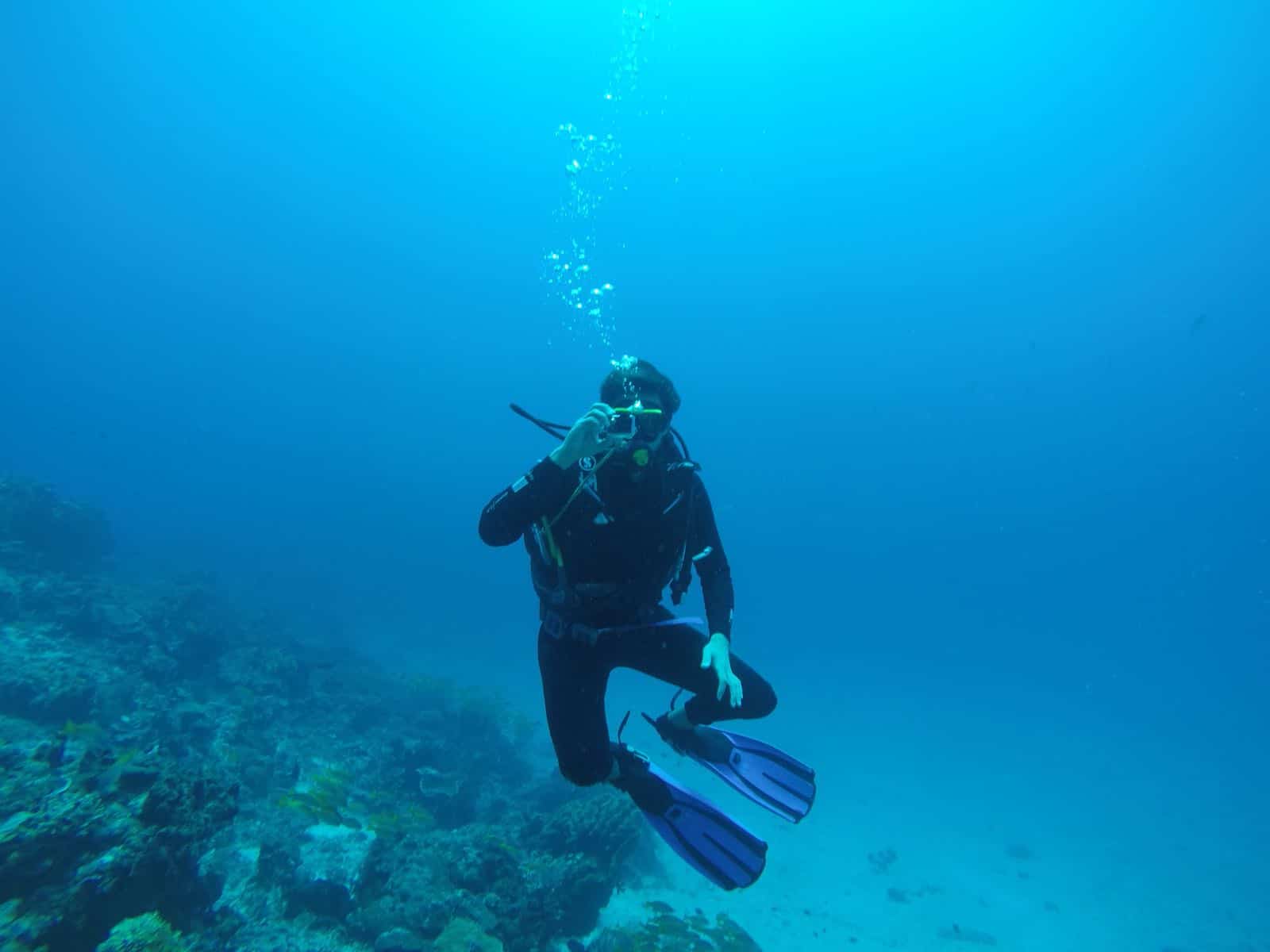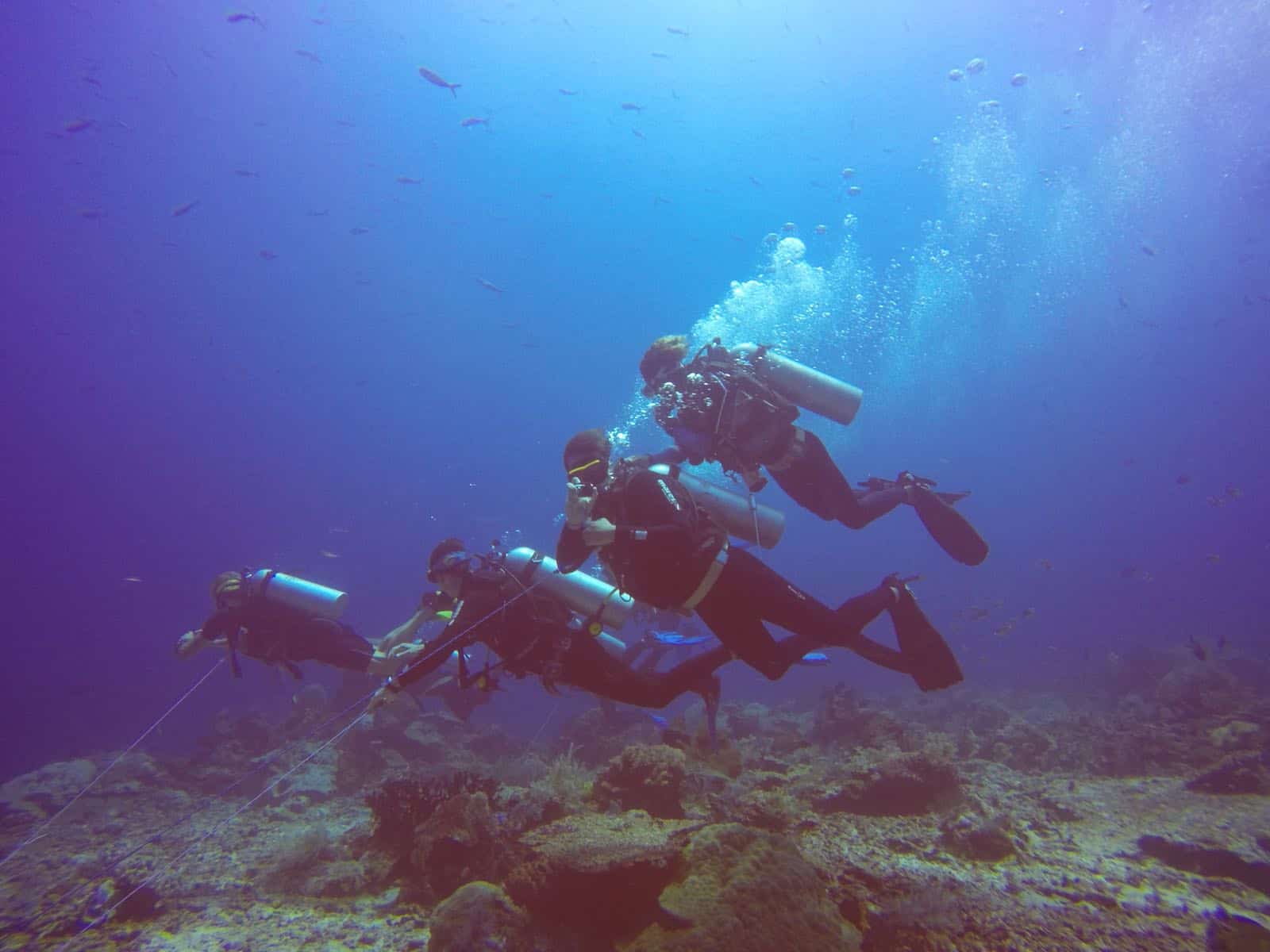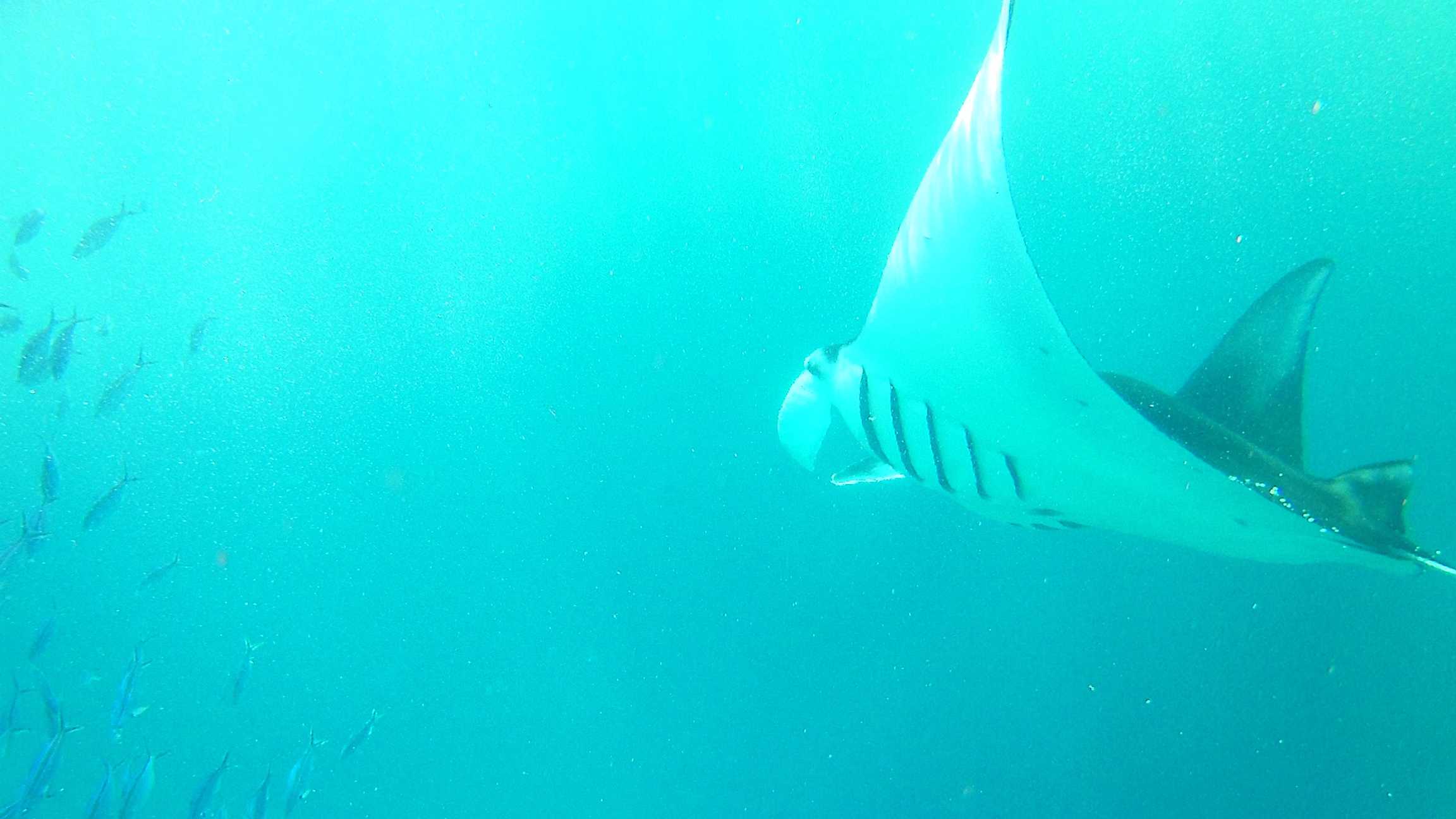
This article is a re-post from Fathom Consulting's Thank Fathom its Friday: "A sideways look at economics". It is here with permission
By Brian Davidson*

The Komodo National Park is best known as the home of the Komodo dragon, the world’s largest and most fearsome lizard, which grows up to three metres, eats fully-grown deer and has been known to attack and kill humans. The dragons are only found in this part of the world, which is why the national park was declared a UNESCO World Heritage Site in 1991. But for me, and other diving enthusiasts, the real magic of the park lies underwater, where you can find some of the best dive sites in the world.
The channels of the Komodo Park link the Flores Sea in the north to the Savu Sea, and Indian Ocean, in the south, creating strong underwater currents and attracting large fish. Our first dive was at an underwater pinnacle in the middle of one of the channels, home to coral and smaller reef fish, where we were joined by tuna, giant trevally, humphead wrasse and turtles.

On another dive I counted at least eight reef sharks; one of which drifted around us for several minutes, at times just a few meters away, as we floated in the strong currents after hooking ourselves to a rock. I’m really scared of sharks when swimming in the sea, bodyboarding or surfing, but for some reason I wasn’t worried at all. Perhaps I felt like an equal because I was submerged and could see them eye to eye. Or maybe I was just suffering from nitrogen narcosis, a drunk-like feeling that divers experience when gases in their tank react a certain way when deep under water.

Perhaps I should have been nervous. After all, the shark was almost as big as me and on two occasions she gyrated suddenly and closed her jaws fiercely, swallowing some unfortunate little fish swimming next to her. She didn’t seem to be in a good mood either and her pectoral fins were pointed down, which I later discovered is a sign that a shark is upset, hungry or defensive and that it would be best to “give it some distance”. In reality though, I was probably very safe: sharks hardly ever kill humans; we normally kill them.
Millions of people enter the sea, but there are, on average, about 80 recorded unprovoked shark attacks on humans per year. We kill around 100 million of them each year.[1] I don’t have a problem with humans eating meat, or fish, or sharks — to me that’s natural. But most sharks are killed inhumanely by humans, who cut their fins off and toss them back into the water to die a slow death. Or they die after getting tangled in fishing nets. Most worryingly, sharks are being killed by humans faster than they can reproduce, meaning that the ocean’s ecosystems are getting pushed out of balance.
Fortunately, the Indonesian government is fighting back. Their solution: blowing up fishing boats. I initially thought that this was an absurd idea and unnecessary. But after some investigation it turns out that there is method to their madness. In fact, it seems to have deterred illegal fishing and put the country’s fisheries on a sustainable path, without harming the local economy.
Illegal fishing is a huge problem for a country like Indonesia, which has more than 13,000 islands in its territory and thousands of miles of coastline to protect. Until recently its fish stocks were being depleted at an unsustainable rate. My dive instructor told me that the shark population in Komodo has dwindled over the years thanks to illegal fishing. To tackle the problem, in 2014, the government banned foreign fishing vessels from operating in their waters. They detained hundreds of rule-breaking crews, but sooner or later the same crews and boats would return to Indonesian waters.
It was then that the government decided to adopt a radical deterrent: blowing up illegal, unreported and unregulated fishing boats (so-called IUUs). Needless to say, this caused some uproar among the foreign fishing community, governments and others. But Indonesia has persisted with this practice and they have now sunk more than 350 foreign IUUs.[2] A study by Indonesian and US fisheries experts has shown that the extreme measures are working: since their adoption, total commercial fishing in Indonesian waters has fallen by 25%, more than the 15% needed to put their fisheries on a sustainable path.[3]
Some liberally-minded economists might scorn these measures and brand them protectionist. I see it a different way: the Indonesian government is ensuring that its policy objectives are met. Besides, Indonesians can still catch and trade fish commercially, but the government needs to put its fish stocks back onto a sustainable path to ensure the long-run prosperity of its fishing industry. What’s more, since fish know no boundaries, these policies will boost fish stocks in the waters of neighbouring countries too. The policies also support Indonesia’s booming tourism industry and help to protect the livelihoods of Indonesia’s many local subsistence fishermen. It’s also claimed that the foreign vessels were bringing in contraband goods, not paying taxes, and in addition to nicking the fish, they were leaving with other things that they shouldn’t, such as the endangered birds of paradise.
I do feel for the crews of the destroyed vessels. Many of them are humble people, trying to eke out a living. But ultimately, rules are rules and they have been put in place for a good reason. In many cases, individuals acting in their own self-interest leads to good economic outcomes for society. This is Adam Smith’s invisible hand theory, developed in the 18th century and valid today. But in certain situations, free-for-alls don’t work, as explained by the 19th century British economist William Foster Lloyd, in his theory known as the tragedy of the commons.
According to Wikipedia, this theory describes “a situation in a shared-resource system where individual users acting independently according to their own self-interest behave contrary to the common good of all users by depleting or spoiling that resource through their collective action”. Mr Lloyd was probably thinking about small rural pastures at the time, but this is now clearly relevant to our oceans. Research into sustainable economic growth won Paul Romer and William Nordhaus a Nobel Prize this year, highlighting the importance of this topic.
The bottom line and my key takeaway after my diving experiences in Komodo and my time at the yoga retreat in Ubud, was the following: do what you need to do and take care of yourself; just don’t crush everybody else’s vibe in the process. I may still be despondent about how divided and toxic politics have become. Humans might not agree with each other, but surely we can agree to respect our oceans and its inhabitants? Not just for tourists like me, but for our long-run economic and food security too. I won’t be submitting this blog post to the Nobel Committee, but as a final word, I leave you with my manta ray experiences.
As we drifted down the channel at a rate of knots over thousands of small rocks and broken pieces of coral, I felt like I was skydiving or a Navy SEAL on a mission. There weren’t many things to see on this dive, other than, hopefully, some manta rays. After around twenty minutes, suddenly it came into view. The first task was not to swim into it. (I say swim, but in reality I was just being swept by the current.) The second task was to not let your bubbles go in its face and scare it away. I just about managed those things, before grabbing onto a rock and watching the huge, graceful creature, which looks like some sort of an alien spacecraft, glide feet away from my face. At one point, it seemed to be heading straight for me, before it effortlessly shifted direction and swam past. They are big. But they aren’t dangerous; their tails have much less venom than other, smaller rays. It had me buzzing.

The next day was even better. We were dropped in the ocean with a snorkel, mask and fins at a place called Manta Point, a so-called cleaning station where mantas go to get parasites picked off their skin by cleaner wrasse as they glide by. There’s no guarantee that you’ll see them, all you can do is hope. Our captain had been scanning the water for just a few minutes before telling us to jump in. We drifted one way and the mantas swam another way. Try that again. Back on the boat. Find more mantas. Second time lucky. The whole experience must have lasted less than ten minutes, but it felt like an hour as manta ray after manta ray glided past. They were huge (some grow to have a wingspan of seven metres). And there were so many of them, coming from all sides; there must have been more than 50 in total! It was an incredible, mind-blowing experience. One of those moments when the world makes you feel great, because you feel so small.
[1] https://www.nationalgeographic.com/people-and-culture/onward/2013/03/01/100-million-sharks-killed-every-year-study-shows-on-eve-of-international-conference-on-shark-protection/
[2] : https://www.scientificamerican.com/article/blowing-up-illegal-fishing-boats-helps-indonesian-fishers/
[3] https://www.nature.com/articles/s41559-018-0499-1
Brian Davidson is a senior economist at Fathom Consulting in London, England. This article is a re-post from Fathom Consulting's Thank Fathom its Friday: "A sideways look at economics". It is here with permission
3 Comments
Joko Widodo is a legend and should be given the Nobel Peace Prize. An example of a leader who is both strong and wise.
Wish they'd apply the same rigour to stopping rainforest being razed
Good on them. Wish we'd do it here and every other country around the world.
I consider overfishing to be a much more pressing problem than climate change.
We welcome your comments below. If you are not already registered, please register to comment
Remember we welcome robust, respectful and insightful debate. We don't welcome abusive or defamatory comments and will de-register those repeatedly making such comments. Our current comment policy is here.